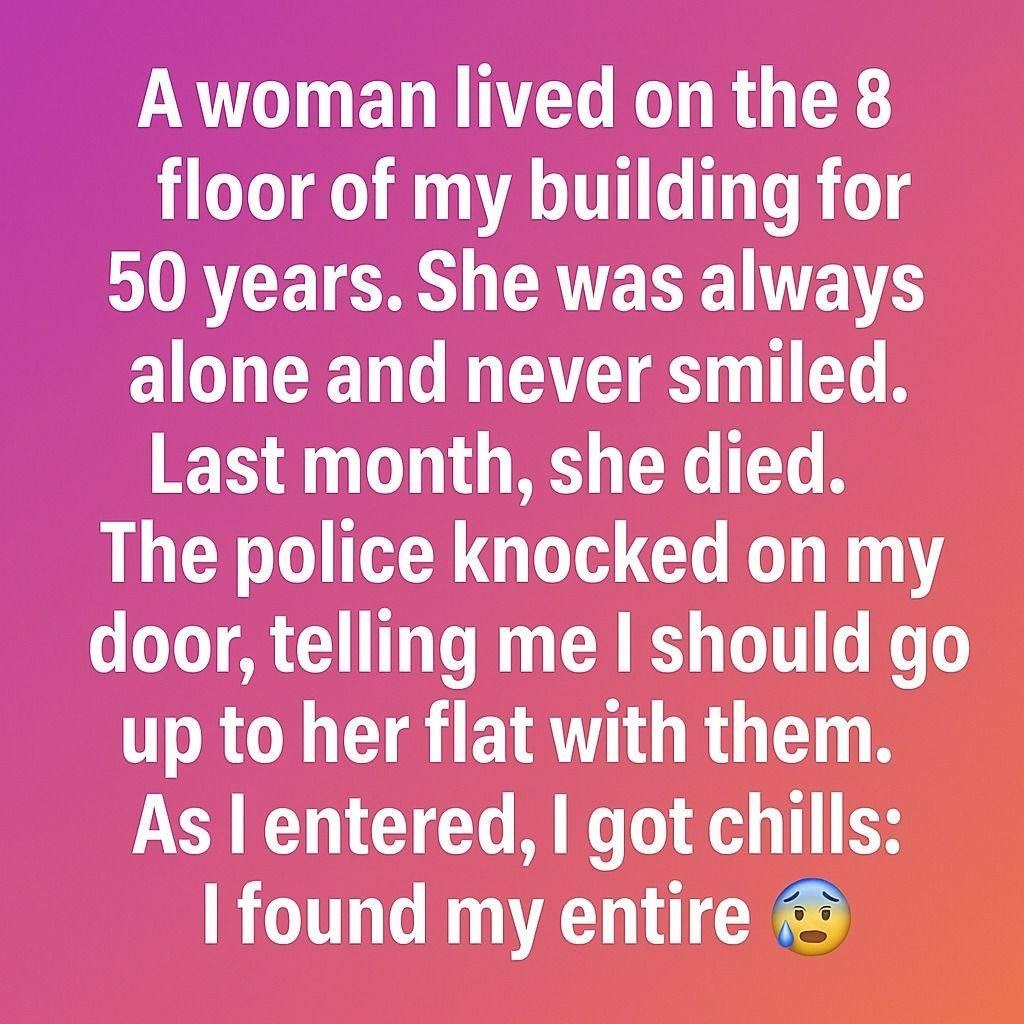For fifty years, the woman on the eighth floor lived alone. No visitors. No laughter. No warmth behind her window—just a soft yellow glow that flickered on every evening and went dark before dawn. Most people in the building barely noticed her anymore. To them, she was just the quiet old lady upstairs.
But I noticed her.
When I was a kid, I used to pass her door every morning on my way to school. Apartment 8B always smelled faintly of lavender and dust. I never saw her come out, but sometimes I’d hear her slow footsteps or the faint creak of her rocking chair through the thin walls. My mom told me she’d lived there since before I was born, that her name was Mrs. Hill, and that she “kept to herself.”
Something about that phrase stuck with me. “Kept to herself” sounded lonely.
So, one day, I drew her a picture. A messy crayon rainbow on notebook paper with a stick-figure family standing beneath it. I wrote, “Have a happy day!” in crooked blue letters and taped it beside her door before heading to school. The next morning, the drawing was gone.
That small act became a ritual. Every few days, I’d leave another scribble—flowers, suns, smiling faces, little notes that said, “You’re not alone,” or “I hope you smile today.” Sometimes, I’d tuck wildflowers from the park under her welcome mat. I never knew if she saw them. I never saw her face. But I kept doing it, year after year, until high school pulled my focus elsewhere. Eventually, the habit faded.
I grew up, moved out, and came back years later when life got complicated, ending up in the same building again—this time as an adult, paying rent on the fifth floor. Mrs. Hill was still up there on eight. I’d see her silhouette sometimes through the hallway window, a small figure by the curtain. I wanted to say hello, but I never did.
Then, last month, she died.
One afternoon, a uniformed officer knocked on my door. “You’re Daniel Reed?” he asked. When I nodded, he said, “We found something in her apartment with your name on it. You might want to come up.”
The elevator felt slower than usual, its hum echoing like a heartbeat in my chest. When the door opened, the hallway smelled faintly of old perfume and floor polish. Apartment 8B’s door was open.
The place was small and dimly lit, filled with the quiet weight of a life paused mid-breath. And then I saw them—my drawings.
Every wall, every inch of space was covered with them. Framed. Protected. Loved.
My childish crayon sketches—rainbows, stick figures, crooked hearts—all hung in neat rows. My notes were preserved under glass. Even the flowers I’d left so long ago had been pressed flat, their colors faded but still visible, sealed between panes. It was like stepping into a museum of my own forgotten kindness.
My throat tightened. “She… she kept all this?” I whispered.
One of the officers handed me an envelope. “This was on her table. It’s got your name on it.”
I opened it carefully. Inside was a letter written in shaky cursive:
“Dear Daniel,
You were the only person who ever made me feel seen. I never had children, never a family of my own. But your little drawings became my reason to look forward to each morning. Every time I found one, it reminded me that kindness still exists in this world. Everything you see here—I kept because they made my home feel alive.
Thank you for giving me joy when I thought I had none left.
With love,
Mrs. Hill.”
I couldn’t hold back the tears. I stood there, surrounded by the echoes of my own childhood—by proof that something as small as a crayon drawing could matter so much to someone.
I had never known her story. The neighbors said she’d lost her husband decades ago and had no family left. She’d lived quietly, always polite but distant. People said she preferred solitude, but that wasn’t true. She hadn’t chosen loneliness—it had chosen her.
And somehow, my childish impulse to make a stranger smile had given her something to hold onto.
The police let me take the drawings home. They said it was what she’d wanted. That night, I spread them out across my living room floor, tracing the faded lines of my seven-year-old self. I realized how easily we underestimate the power of small kindnesses—the ones we give without expecting anything in return.
I framed one of the drawings—the rainbow, the first one—and hung it by my door. Every time I leave my apartment now, I see it and think of her. I still can’t ride the elevator past the eighth floor without whispering a quiet thank you.
Mrs. Hill taught me something I’ll never forget:
That a single act of care, however small, can fill the emptiest rooms.
That kindness leaves marks deeper than memory.
And that sometimes, the smallest gestures echo the loudest—long after we’re gone.
